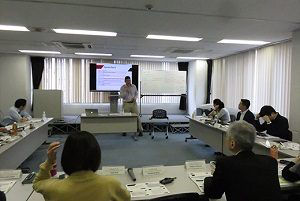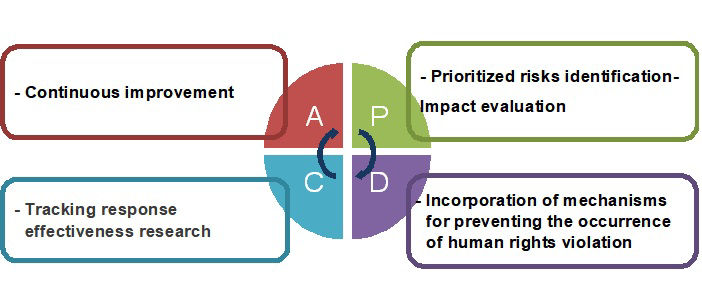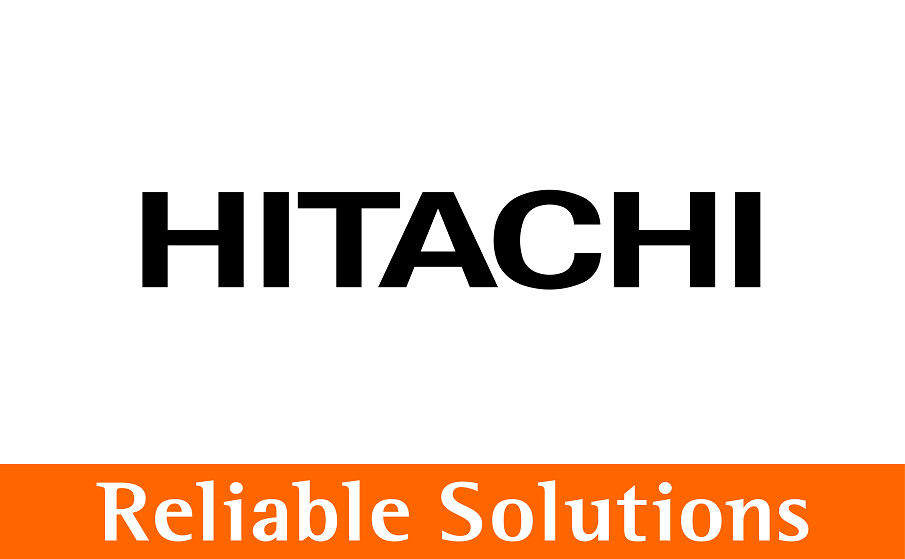Human Rights
Policies about respect for human rights
Hitachi Construction Machinery group clearly establishes “Hitachi Construction Machinery Group Codes of Conduct” and “Hitachi Construction Machinery Group Human Rights Policy”, and undertakes initiatives for respecting human rights. The Hitachi Construction Machinery Group Human Rights Policy , formulated in March 2014 refers to a minimum understanding of the human rights as described in the International Bill of Human Rights*1 and the International Labor Organization’s (ILO) Declaration on Fundamental Principles and Rights at Work*2. It also mentions human rights due diligence*4 based on the United Nations Guiding Principles on Business and Human Rights*3 and clearly stipulates the implementation of appropriate education for employees, compliance with the laws of the countries or regions in which business is conducted, and the pursuit of methods for respecting international human rights principles when there are conflicts between internationally recognized human rights and the domestic laws of individual countries and regions. “Hitachi Construction Machinery Group Human Rights Policy” has been approved by the Executive Committee and the Board of Directors. Hitachi Construction Machinery Group also urges business partners and suppliers to support this human rights policy and implement efforts to respect human rights.
Hitachi Construction Machinery group supports and respects international standards related to human rights, including respect for freedom of association and the right to collective bargaining, equal pay for equal work, the prevention of child labor and forced labor, and the prohibition of discrimination in employment and occupation, the prohibition of discrimination and harassment in business activities and focuses on the promotion of human rights education and the prevention of child labor and forced labor. In FY2015 we participated in Human Rights Workshop held by Hitachi group, which was the parent company at that time. This workshop was part of Hitachi group’s initiatives for human rights due diligence based on Hitachi group Human Rights Policy with advice from Shift, a U.S. NPO consulting firm, and we evaluated risks and priorities for human rights in the supply chain and confirmed measures for reducing these risks.
Moreover, we have established a whistle-blowing system for employees and advice lines for external stakeholders as part of our human rights reporting mechanisms.
The whistleblowing system regarding human rights includes a “compliance hotline” regarding compliance and a “harassment consultation desk” regarding harassment and discrimination. Hitachi Construction Machinery has set up the harassment consultation desk for each labor union branch. This consultation desk is handled by a member of the personnel department on the company side and a member of the labor union branch on the labor union side. Any allegations are taken seriously and handled confidentially and sympathetically. If allegations are confirmed, corrective action, disciplinary action, or legal action will be taken.
In FY2023, there were 5 harassment-related disciplinary actions for the entire Hitachi Construction Machinery Group. The results of disciplinary action cases are reported to the Executive Committee and Board of Directors every business year based on reports from domestic and overseas group companies. The FY2023 results report was submitted and approved in May 2024.
∗1 Collective term for the Universal Declaration of Human Rights and International Covenants on Human Rights adopted by the United Nations General Assembly.
∗2 Includes upholding the freedom of association and the effective recognition of the right to collective bargaining, equal pay for equal work, rejecting forced labor, effective elimination of child labor, and abolition of discrimination in hiring and employment.
∗3 “Report on Human Rights and Issues of Multinational Enterprises and Other Enterprises” by then Special Representative of the Secretary-General John Ruggie.
∗4 This refers to identifying, evaluating, and responding to the actual impacts that business has on human rights; taking measures to prevent, mitigate, or provide aid for negative impacts; and continually verifying and disclosing the results of such measures.
Taking on human rights due diligence
Nurturing the minds of employees to have a deep understanding of human rights and mutual respect for one another is essential in developing a corporate culture where employees with a diverse set of values and thinking can come together and flourish. In light of this, Hitachi Construction Machinery group is actively promoting measures, including the exchange of personnel between global sites.
In FY2016, we participated in the Human Rights Due Diligence Working Group, which was launched primarily by the human resources and CSR divisions of Hitachi, Ltd, which was the parent company at that time. The working group evaluated risks and priorities for human rights on employees and confirmed measures for reducing these risks. At the workshop, we looked at the examples of Hitachi Construction Machinery (Europe) N.V. and PT Hitachi Construction Machinery Indonesia. We discussed the issues being confronted by these two companies and measures for mitigating risks.
Harassment and discrimination issues are triggered in part by the cultural background of the local area, so it is necessary to promote understanding of each region. In addition, the policies and initiatives of the headquarters have not been instilled at some overseas group company business sites and factories. Therefore, we need to gain a deeper understanding of each individual employee.

Based on the consideration result written above, we have taken more in-depth measures and utilized our group’s common priority risk assessment survey with 30 questions* for “forced and migrant labor,” which we have defined as priority risks that should be tackled from FY2020. More specifically, we had started conducting and evaluating the concerning labor/ safety and health/ handling of complaint process.
Since FY2020, we have conducted surveys at a total of 63 domestic and overseas factories and group companies. As a result, countermeasures are being implemented at a total of 15 sites that had evaluation items below a certain level.
After FY2022, we have conducted a risk assessment survey of suppliers and received responses from 618 target suppliers.
We requested7.2% of the responses at the level below a certain level to make improvements. As for those, we confirmed that 75.8% of the improvements had been completed, and we will keep following-up to request improvement for the remaining 24.2% in the future.

In May 2021, Hitachi Construction Machinery Group has established the “Hitachi Construction Machinery Human Rights Due Diligence Promotion Council” with the president as the responsible manager. This council has been held 6 times up to the last fiscal year, and we will carry out a PDCA (plan -do -check -action) cycle for human rights due diligence through this council. At these councils, we not only report the results of risk assessments to employees and procurement partners, but also confirm and report on the consideration, implementation, and progress of countermeasures for items below a certain level.
*An example question of risk assessment survey /
Does your company and workers agree on the contract documents that state, at a minimum, the key employment terms and conditions required by local laws and regulations, in a language properly understood by them? (Key employment terms and conditions include job description, period of the labor contract, place of work, working hours, wages, deductions from wages, and disciplinary rules.)
Human rights education and training
Hitachi Construction Machinery Group continually implements education concerning human rights included in stratified training for new employee and new section manager, and so on, for the purpose of improving each individual employee’s awareness of human rights.
Results of human rights training from FY 2021 to 2023
| Total | Managers and above | Employees | |
| Hitachi Construction Machinery | 4,284 | 801 | 3,483 |
| Hitachi Construction Machinery Group companies ※ | 4,240 | 741 | 3,499 |
| Total | 8,524 | 1,542 | 6,982 |
Establishment of correspondence course for harassment measures
Since FY2021, Hitachi Construction Machinery has established the “Preventing power harassment, sexual harassment, and maternity harassment! comprehensive harassment countermeasures course” as one of the correspondence courses for the purpose of preventing power harassment. The subsidy rate for those who have completed correspondence education is usually 60%, but this course is 100% as a response to social efforts.
Preventing child labor and forced labor
In “Respect for Human Rights,” Chapter 3 in the Hitachi Construction Machinery Group Codes of Conduct, we declare that the Group will not employ child labor (work from children who are younger than the minimum work age) and forced labor (labor against the will of the employee). For foreign technical intern trainees at Hitachi Construction Machinery, the audit status is confirmed by the supervising organization, and the “foreign technical intern training system” is being operated appropriately.
It also makes reference to procurement activities that maintain a focus on respecting human rights, including the prohibition of unfair discrimination in hiring and employment, and the elimination of child labor and forced labor.
The Hitachi Construction Machinery Group Sustainable Procurement Guidelines covers areas such as the prohibition of forced labor, prohibition of inhumane treatment, prohibition of child labor, prohibition of discrimination, appropriate wages, management of working hours, and respect for employee collective bargaining rights, and we demand that suppliers comply with these precepts. Moreover, Hitachi Construction Machinery group continues its dialogues with suppliers on the non-use of conflict minerals as per the Hitachi Construction Machinery Group Conflict Minerals Procurement Policy.
Slavery and Human trafficking Statement
Based on the “Hitachi Construction Machinery Group Human Rights Policy,” Hitachi Construction Machinery Group has widely issued statements regarding slavery and human trafficking, such as the British Modern Slavery Act ((2015)) and the Australian Modern Slavery Act (2018).

